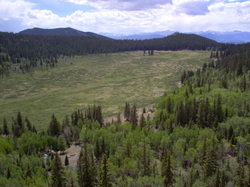
Denver to Durango, www.coloradotrail.org
By paved road, the route from Denver to Durango is 336 miles—you can make it there in six or seven hours. But if you’ve got more time (a lot more time), take the Colorado Trail, which runs about 480 miles between the two cities. By foot, the trip usually takes more than a month, although one especially energetic fellow zipped over it in just two weeks, sustaining himself on a diet of vegetable oil and multivitamins. The trail starts at Waterton Canyon southwest of Denver at about 6,000 feet above sea level and ends near Durango at and elevation of about 7,000 feet, but it climbs a mind-boggling 77,690 feet (and drops 76,210 feet) in the process.
But don’t feel compelled to undertake the entire journey (I haven’t). There are a number of access points near mountain towns that allow for great day hikes on the trail. And if you are feeling like a week of hard but rewarding labor in the backcountry, you can sign up for a volunteer trail crew and help reverse the ravages of snowmelt. Some volunteers sign up for multiple crews, which is one of the cheapest ways to sustain yourself in the Rockies for a summer: One $60 fee covers all of your meals for every day you volunteer, all summer long.
By paved road, the route from Denver to Durango is 336 miles—you can make it there in six or seven hours. But if you’ve got more time (a lot more time), take the Colorado Trail, which runs about 480 miles between the two cities. By foot, the trip usually takes more than a month, although one especially energetic fellow zipped over it in just two weeks, sustaining himself on a diet of vegetable oil and multivitamins. The trail starts at Waterton Canyon southwest of Denver at about 6,000 feet above sea level and ends near Durango at and elevation of about 7,000 feet, but it climbs a mind-boggling 77,690 feet (and drops 76,210 feet) in the process.
But don’t feel compelled to undertake the entire journey (I haven’t). There are a number of access points near mountain towns that allow for great day hikes on the trail. And if you are feeling like a week of hard but rewarding labor in the backcountry, you can sign up for a volunteer trail crew and help reverse the ravages of snowmelt. Some volunteers sign up for multiple crews, which is one of the cheapest ways to sustain yourself in the Rockies for a summer: One $60 fee covers all of your meals for every day you volunteer, all summer long.
 RSS Feed
RSS Feed